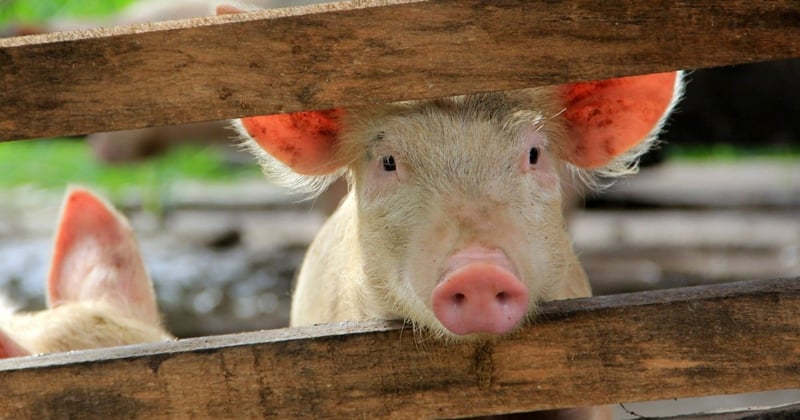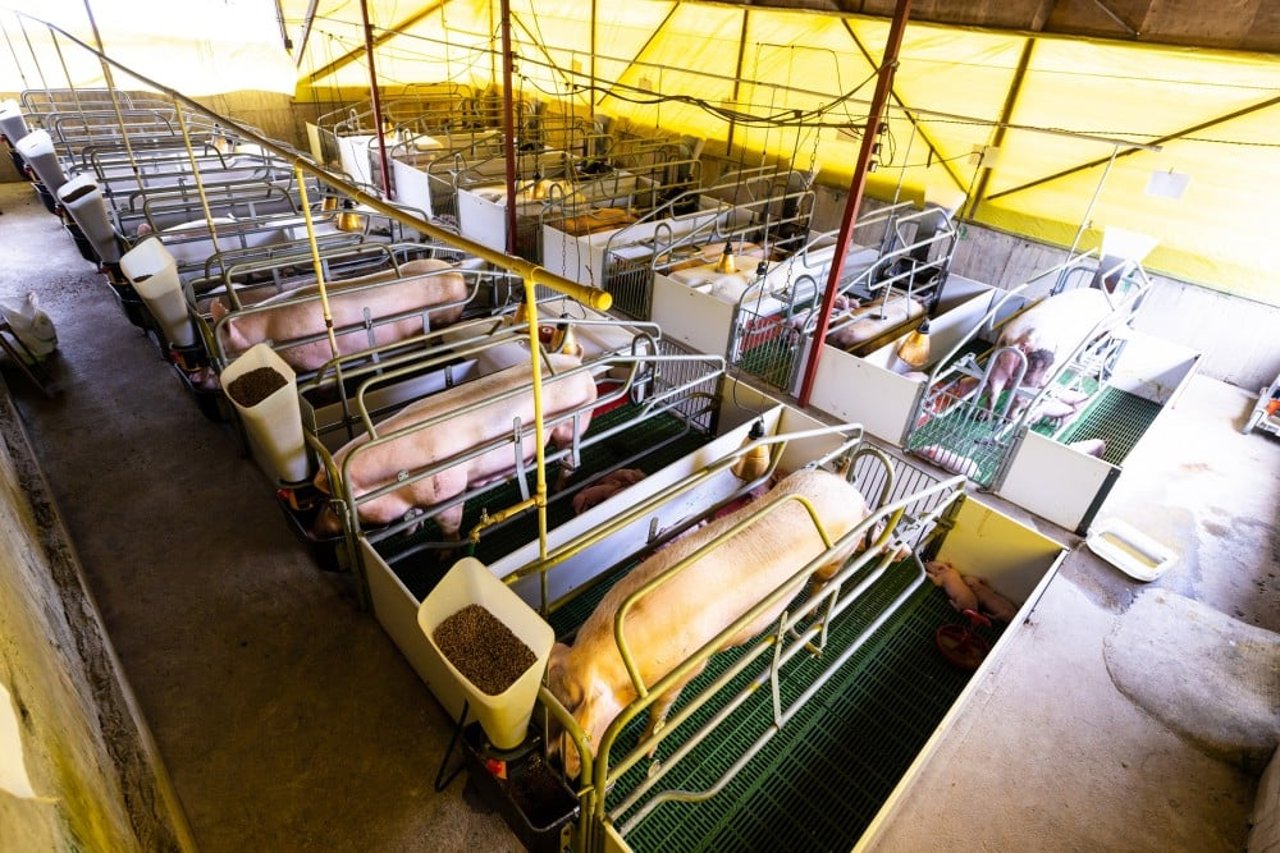
Often underestimated, pigs are incredible animals that possess a rich and complex range of feelings.
Pigs don’t have great PR. When the public thinks of pigs, they often think of just dirty animals with big appetites. But they couldn’t be more wrong. Pigs are wonderful animals with a whole range of emotions.
Comparing intelligence between different species is complicated, but pigs are generally considered one of the most intelligent animals on earth. They are at least equal to dogs in terms of their cognitive ability and may be just as intelligent as many primates.
They can learn their own names in just two weeks. They can even play video games. They clearly have impressive problem-solving skills.
Intelligence is important, but there’s more to life than just being clever. In addition to their powers of thought, pigs are also profoundly emotional animals, capable of experiencing powerful feelings.
What do we know about pig emotions, and what does it mean for our relationship with this misunderstood species?
Do pigs experience emotions?
Pigs absolutely feel emotions. Importantly, they can form strong (and lasting) social and emotional relationships with other pigs and with humans.
Pigs' emotional intelligence
So, how do we know that pigs feel strong emotions and are able to form meaningful connections with others? You might be surprised at just how much research has been conducted and how much evidence we have about their emotional intelligence. Let’s take a look at just a few findings about the emotional lives of pigs.
Pigs are empathetic
Pigs can pick up on the emotions of others.
Researchers have trained pigs to associate specific events with certain types of music. Some of those events were positive while others were negative. Trained pigs will respond to the music, showing that they’re anticipating the right event. This demonstrates their intelligence.
When researchers placed an untrained pig in the same pen as a trained one, it picked up on the behaviour of the trained pig and started to respond in the same way. The untrained pigs ‘read’ the other pig’s emotional state and became either nervous or excited as well.
These are examples of pigs showing empathy and potentially also emotional contagion.
Pigs use a variety of tones to communicate
Pigs use different noises and tones to communicate.
While pigs don’t have verbal language that’s as complicated as the languages humans use daily, they can communicate their emotions through different sounds.
One of the strongest (and sweetest) examples is that nursing mothers will ‘sing’ to their piglets while suckling. There is evidence that these are not purely functional noises and are more about forming a connection and building an emotional bond between mother and piglet.
Piglets also learn the sound of their mother’s voice and can seek her out when she calls — differentiating her voice from other sows.
Pigs have strong memories
Pigs can be fascinating animals to study, especially because they seem keen to work with researchers. They learn quickly, and, importantly, they remember tasks even after considerable periods of time.
This isn’t just about their ability to do well in intelligence tests. It has huge welfare implications. The more an animal can remember, the more emotional distress they are likely to experience if they’re not looked after well..
Pigs will remember times when they have been hurt or distressed and respond with fear and anxiety in similar situations.
Pigs feel pain and suffering
Speaking of which, let’s be clear. Pigs can experience both pain and suffering.
When you think of the noises pigs make, you probably imagine both a deep, contented grunt and a high-pitched squeal. Those high-pitched squeals are usually associated with them being in pain or feeling anxious and afraid.
Pigs also respond to fear and pain in the same way that most of us do. They turn to those around them for comfort. Pigs seek out social contact with other pigs when they are experiencing negative emotions.
Pigs can also be more anxious watching other pigs’ conflict than when they’re involved in the conflict themselves, suggesting a high degree of empathy.
Pigs are highly social
Pigs are deeply social animals.
Pigs will naturally stay close to other pigs when possible and devote lots of their time to socialising with those around them.
They typically form close emotional bonds and live together in groups whenever possible. They will even sleep nose-to-nose with other pigs to maintain their deep connections.
Pigs seem to naturally develop social hierarchies, predominantly communicated through their noises and scent. They can even build these hierarchies while blindfolded.
Pigs kept as companion animals seek human connection
They are also very friendly with people. When kept as companion animals, pigs display many of the same qualities as cats and dogs.
Pigs can tell the difference between different people around them. They know all of their regular handlers, and they will react differently to them compared with people they are unfamiliar with.
When pigs are kept as companion animals, they actively choose to spend time with their humans, seeking them out for companionship and affection. They will follow their owners from room to room, preferring to be close to them.
Although pigs enjoy being close to their owners, they typically stay farther away from them when unfamiliar people are around. Although they are comfortable with the people they share their lives with, this doesn’t mean they are relaxed around all humans.
Factory farming is a cruel way to treat such emotionally intelligent animals
As we’ve seen, pigs can feel a wide range of emotions, and they feel them deeply. Intensive farming pays no attention to that fact. The industry relies on the rest of us not paying attention to the terrible conditions and practices.
Mother pigs are kept in cages
Pregnant pigs are kept in farrowing crates. This innocuous description hides the cruelty involved. These pigs are kept isolated from their social group in small cages where they give birth and feed their babies.
Remember that these social animals turn to each other for comfort when anxious or afraid. Keeping them isolated during that time is unquestionably cruel.
Piglets are taken from their mothers
Given the opportunity, mother pigs spend considerable time with their babies, calling to them when it’s time to feed and raising them just like so many other animals. In nature, piglets will stay with their mother until they are around three months old and form strong connections during that time. Modern factory farming doesn’t allow those bonds to form.
In fact, the mother has little opportunity to interact with her piglets. She can see her piglets but can’t always interact with them, causing both the mother and her babies great distress. Instead, her litter is fed according to a schedule. In most factory farms, Piglets are often removed from the mother at just 21 days old.
This separation is something that would never happen if the animals were able to behave naturally. Both mother and babies will be afraid and distressed by being separated so early in life.
What you can do to help pigs in cruel factory farms
By now, we’ve hopefully helped to clear up some of the misconceptions about pigs. They’re actually clean, highly intelligent, and deeply social animals. They feel a wide range of emotions, including fear, pain, and anxiety.
Once you realise this, it becomes impossible to justify the conditions at intensive pig farms. We simply can’t justify allowing these sentient, emotional animals to suffer in the pursuit of higher profits.
By joining our community you can help improve animals’ welfare and the legislation and practices affecting sentient beings.
They are at least equal to dogs in terms of their cognitive ability and may be just as intelligent as many primates.
